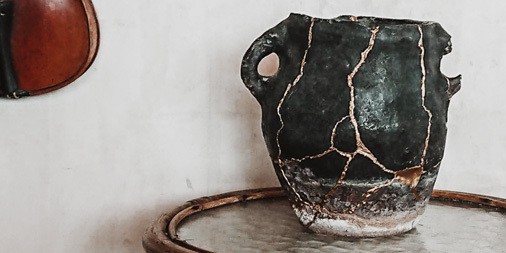
There is a Japanese art form called kintsugi which involves repairing broken pottery with gold-dusted lacquer. Rather than trying to hide or cover the breaks, the sealed cracks and imperfections of the pottery are embraced. The damage and subsequent repair is honored and treated as part of the history and value of the object.
I think too often we run from our brokenness instead of embracing it. We try to hide it from others, from ourselves — even from God — because we think strength and self-sufficiency are more valued and worthy of more love, more respect. We cover our cracks instead of displaying them proudly with gold.
2 Corinthians 12:9 reminds me of this concept but I’ve always struggled to grasp it. The Apostle Paul says: But he [Jesus] said to me, "My grace is sufficient for you, for my power is made perfect in weakness." Therefore I will boast all the more gladly about my weaknesses, so that Christ's power may rest on me.
I’m sorry, but what? How is Christ made powerful through my weakness exactly? Wouldn’t His power be more evident in my strength and all the things I can accomplish?
No.
It’s like carrying water in a broken pitcher. It’s far more amazing to hold water in a broken pitcher than a normal unbroken one, because all the water should be spilling out but isn’t. That’s how we know God is at work. His strength, His power, is put on display through utilizing us despite our brokenness.
The techniques used in kintsugi take a long time to master. There is a precise and delicate balance between the amount of gold and binding agents required to repair the pottery. The process takes time. It cannot be rushed.
So it is with our brokenness. But we try to speed up the process. We want healing, we want our breakthrough. We try to move forward while pieces of ourselves still lie strewn across the floor. We can’t skip these painful, broken places or fast forward to the end. We must allow ourselves the time and space to be put back together.
We forget that there can’t be a “breakthrough” without there first being a breaking. This is hard work. This is painful work. It is often long work. But it is necessary, and inevitable.
Too often breakthrough and healing are portrayed as overnight instances when I think in reality they’re slow-burning, years-long processes. But we must still endure, we must still contend, we must still move forward, piece by piece, however long it takes. Sometimes our progress or healing will be unnoticeable, but if we keep allowing the Lord to enter into our pain, into our brokenness, we will one day look back and notice more pieces of our hearts have been renewed than we thought.
And sometimes - more often than I think we care to admit - we have to be completely broken before we can be restored. There’ll be times when we just get chipped or cracked. But occasionally an event will happen in our lives that will completely and utterly shatter the pottery of our souls, making it seem beyond repair.
In Christ, nothing is ever beyond repair. A bruised reed He will not break, and a smoldering wick He will not snuff out (Isaiah 42:3). He heals the brokenhearted and binds up their wounds (Psalm 147:3).
So don’t be afraid of your brokenness, your pain, your loneliness, your feelings of inadequacy, your suffering, your injustices, your sins.
Our lives - our jars of clay - are going to get battered and broken in this life. There’s no way around that fact. But the beauty of a life lived with the Lord is that He is found even in the shattered ruins lying on the floor. He gently picks us up, piece by piece — Masterful Potter that He is — and puts us back together. Not how we were before. Not without change. But beautiful, and whole, shining His love and life through the gold-dusted seams of our scars.




Leave a Reply
You must be logged in to post a comment.